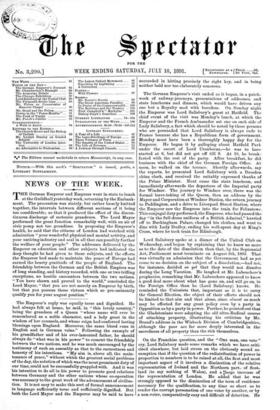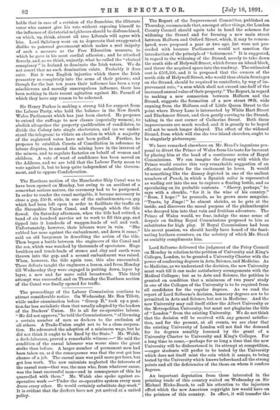On the Franchise question, and the " One man, one
vote " cry, Lord Salisbury made some remarks which we have criti- cised elsewhere, but laid stress on the obviously sound as- sumption that if the question of the redistribution of power in proportion to numbers is to be raised at all, the first and most important aspect of it involves a diminution of the relative representation of Ireland and the Northern part.. of Scot- land (to say nothing of Wales), and a ;large increase of the representation of London. He added that he was strongly opposed to the diminution of the term of residence necessary for the qualification, to any time so short as to render the corrupt personation of one voter by another, or by a non-voter, comparatively easy and difficult of detection. Es
holds that in case of a revision of the franchise, the illiterate voter who cannot give his vote without exposing himself to the influence of dictatorial neighbours should be disfranchised, on which, wg think, almost all true Liberals will agree with him. Lord Salisbury went on to deprecate that exaggerated dislike to paternal government which makes a real iniquity of such a measure as the Free Education measure, to which he gave in his most cordial adhesion ; and he attacked fiercely, and, as we think, unjustly, what he called the " clerical conspiracy" in Ireland to dominate the Irish voters. We do not assert that no such domination exists. Probably it does exist. But it was English injustice which threw the Irish peasantry so completely into the arms of their priests ; and though for the last ten years their influence has been a very mischievous and morally unscrupulous influence, there has been nothing in their recent agitation against Mr. Parnell of which they have any reason to be ashamed.



















































 Previous page
Previous page